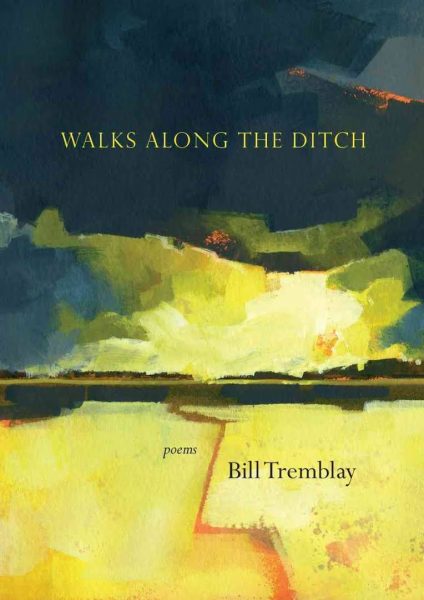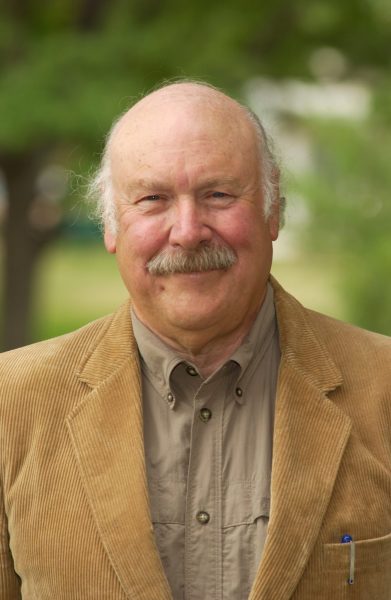Professor Emeritus Bill Tremblay meditates on water and flow
In his latest book of poetry, Walks Along the Ditch, Bill Tremblay (CSU Professor of English, 1973 to 2006) introduces us to the flow that has long provided a cadence to his life. His observations on nature, and the jeweler’s loupe he places over human actions and interactions, guide the reader to meditate with him as he points to a cottonwood along the ditch, then a drone, a lost gosling, and later to a slot machine in a Las Vegas casino, lit up and chirping.
The poems walk us along the ditch with the poet: the water, the familiar Mountain West geography, the “smell of money” from Greeley, the morning song of meadowlarks.
A student of t'ai chi chuan since the 80s, Tremblay demonstrates the search for balance in his poetry and his life.
“Now shift your weight. Feel the lightness.
The aspen leaves are your soul’s friends.
You are not drowning, only dissolving.”

Tremblay describes, in empirical terms, the “flow” he observes and carries with him in his walks along the ditch with all the balance and shift one would expect from a man who observes natural phenomena and the emotional correlations they provoke.
“The ditch flows three different ways. The first way is from the high ground to the low ground, from the west to the east. It goes from the mouth of the Poudre to the town of Eaton, about thirty miles away. There are days when everything is going about two to three miles an hour, everything is meditative, slow, careful -- like a piece of music.
"And there are other days when wind is blowing in from the east -- the upslope. There is a wind that comes out of Wyoming down to Greeley and up toward the foothills. When that wind is blowing stiffly, the water appears to be going backwards. The ripples are toward the west. And you think ‘Wow. It’s going the wrong way. It’s defying gravity.’
"And then there’s a kind of limpid stillness, which is a meditative state that t'ai chi is really all about. You’re making moves, and you are trying to find the stillness within the movement. That’s the whole thing,” says Tremblay.
His poem “Extended Family” reflects Tremblay’s urgency for finding this “stillness within the movement.”
“…people dancing at an open-air wedding--
a quick, final slip and then the black plume.
I walk along the ditch trying to divine
what tempts a man to trigger such a weapon.Small eddies dimple the water’s clear depths.
Sharp objects litter the bottom and make these
swirls into bomb craters where once a wedding
party danced.”
This is the drone poem, where the reader observes the joyous dancing of a wedding party from above, then the sinister black plume the drone releases. In the very next stanza, the poet leads the reader to follow a family of Canada geese as a young gosling, caught in a current, is rescued by elders.
“I’m asking the reader to consider this: What is it about our order? I think it might have been the poet Robert Duncan who referred to our human “order” as disorderly at heart. Out of that disorder comes a great deal of misery: war, wage slavery, a whole lot of things,” says Tremblay.
Pulling from his tai chi chuan practice, Tremblay defines that disorder as a disruption of flow.
“Choke-points in the flow of blood or breath or glandular secretions are the physical imbalance that creates illness. On a socio-political level I think that there are far too many policies that limit human potential; for example, the terrible burden of debt students are forced to bear, often for their whole lives,” he says.
Sometimes we hear a warning flag waving in Bill Tremblay’s poems; advice to slow down, like the water in this ditch: slow, still, defiant. In his poems is a lyrical recipe for balance – do not disrupt the flow. “If we can’t find our humanity, we can’t find our sanity,” he says.
From “What I Tell Myself Before I Go”
“Breathe deep
and slow, deep and slow all the way down
below your navel. Ditch water will open
inside you. When you feel its fountain bubbling
under your arches, balance begins. Reach
equanimity and you are less likely to panic.
A new music begins between your hips.”
Bill Tremblay is the author of nine collections of poems, including Crying in the Cheap Seats [University of Massachusetts Press], The Anarchist Heart [New Rivers Press], Home Front [Lynx House Press], Second Sun: New & Selected Poems [L'Epervier Press], Duhamel: Ideas of Order in Little Canada [BOA Editions Ltd.], Rainstorm Over the Alphabet [Lynx House Press], Shooting Script: Door of Fire [Eastern Washington University Press], Magician's Hat: Poems on the Life and Art of David Alfaro Siqueiros [Lynx House Press], and his most recent work, Walks Along the Ditch [University of Washington Press]. Duhamel: Ideas of Order in Little Canada was selected as a Finalist in the National Poetry Series Awards, 1985, and a Pushcart Prize, 1985. His work of historical fiction is The June Rise: The Apocryphal Letters of Joseph Antoine Janis.
Since 1973 he has lived in Fort Collins, where he was the editor of the Colorado Review for 15 years.
His website is http://www.tremblayscript.com/

